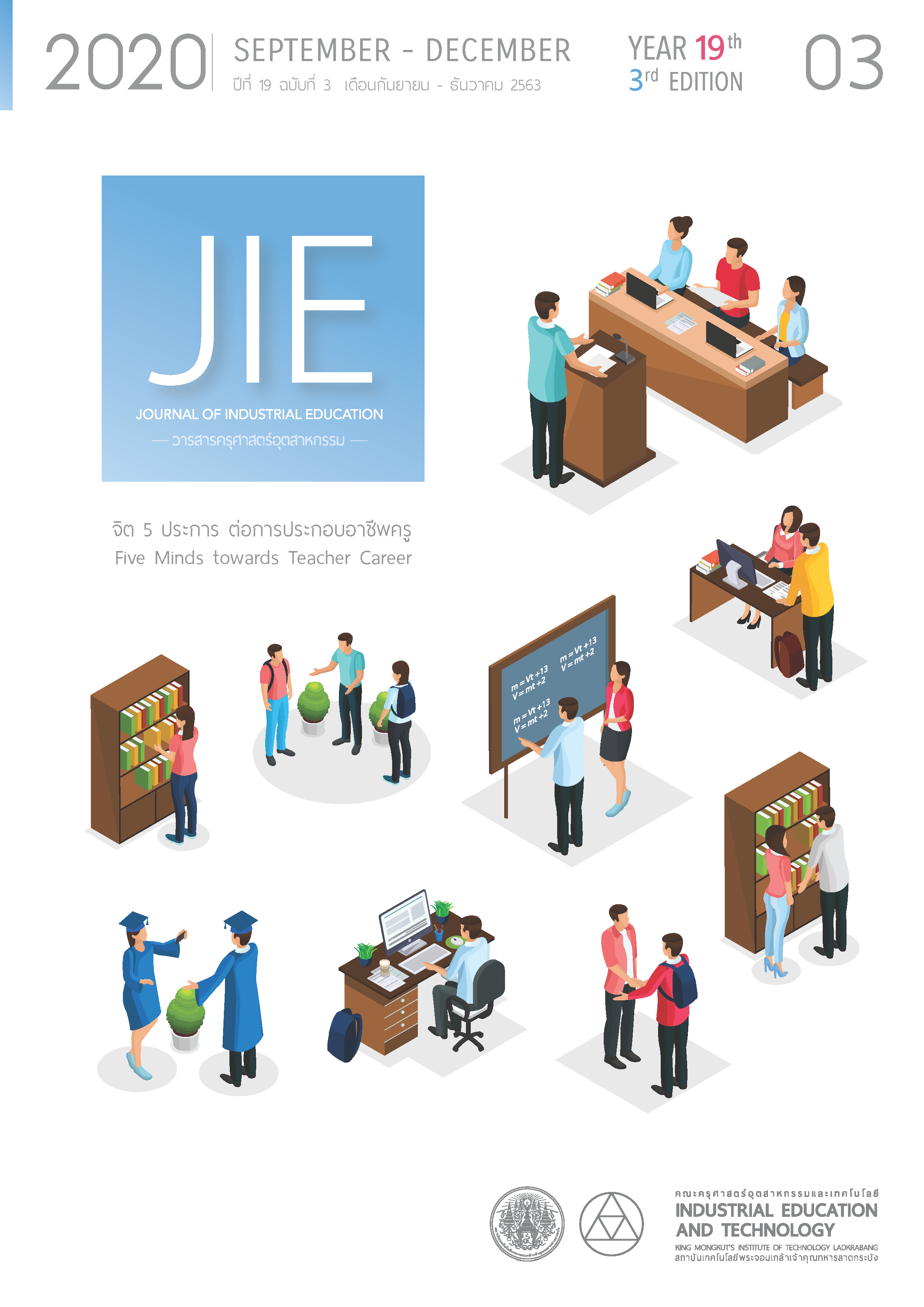DEVELOPMENT OF ANALYTICAL THINKING BY PROBLEM-BASE LEARNING WITH E-LEARNING ON TWO-DIMENSIONAL ARRAY FOR VOCATIONAL CERTIFICATE STUDENTS
Keywords:
Problem-based learning management, Analytical thinking, E-learningAbstract
The objectives of this research are: 1) to develop the learning management plans using problem-based learning management on quality analytical thinking ability; 2) to develop the quality and efficient e-learning lessons regarding two-dimensional arrays; 3) to compare the analytical thinking ability between students learning by problem-based learning management together with e-learning lessons and students learning by normal learning management. The samples are totally 60 vocational certificate students in 2nd Year of Saraburi Technical College, 2nd Semester, Academic Year 2019, selected by random sampling from 3 classrooms, 20 students each. Tools used in this research include Learning Management Plans, Quality Assessment on Learning Management Plans, E-learning Lessons, Quality Assessment on E-Learning Lessons, and Test of Analytical Thinking Ability Assessment, while the statistics applied in the research were Mean (), Standard Deviation (S) and the comparison of Mean values between two independent groups, Independent Sample t – test, with the statistical significance at the level of .05.
The results of research were found that: 1) the quality of learning management plans is in very good level ( = 4.54, S = 0.38); 2) the overall quality of e-learning lessons in terms of content is in very good level (
= 4.64, S = 0.23), the overall quality of media production in terms of technic is in very good level (
= 4.74, S = 0.17); 3) the efficiency of e-learning lessons E1/E2 = 81.20/84.67 which is higher than the set criteria at 80/80; and 4) students learning by problem-based learning management together with e-learning lessons have higher analytical thinking ability than students learning by normal learning management with the statistical significance at the level of .05.
References
Nilsuk. P. (2013). “Educational innovation for enhancing the potential of learners in the 21st century to the ASEAN Economic Community.” Chandrakasem Rajabhat University Graduate Studies Journal. 8,1 : 21-34. (in Thai)
Klaynil. S. (2006). The capacity to solve problems for the world of tomorrow. Bangkok : Seven Printing Group Co., Ltd. 35-36. (in Thai)
The Institute for the Promotion of Teaching Science and Technology (IPST). (2014). PISA 2012 Assessment Mathematics Reading and Science What do students know? And what can be done. Bangkok : Aroonkarnpim Limitted Partnership. 179-183. (in Thai)
The Institute for the Promotion of Teaching Science and Technology (IPST). (2017). Preliminary summary. Bangkok : Aroonkarnpim Limitted Partnership. 21-22. (in Thai)
Othman, H., Salleh, M. B. & Sulaiman, A. (2013). 5 Ladders of Active Learning : An Innovative Learning Steps in PBL Process. 245-253. [Online]. Available http://eprints.uthm.edu.my/id/eprint/4019 Retrieved May 12 2019.
Lekhakula. A. (2008). Problem-Based Learning. Songkla : Prince of Songkla University. 5. (in Thai)
Rarombut. M. (2002). “Development of quality of learning by using PBL (Problem-Based Learning)”. Academic journal. 5,2 : 11-17. (in Thai)
National Economic and Social Development Board (NESDB). (2007). Economic Development Plan and National Society, Issue 10 (2007-2011). 47. [Online]. Available https://www.nesdc.go.th/ewt_news.php?nid=5747&filename=develop_issue Retrieved June 10 2019. (in Thai)
Phophat. A. (2007). “A study on the achievement in analytical thinking of Mathayomsuksa III student by using activities learning packages on concept mapping.” Master’s thesis, Srinakharinwirot University. 16. (in Thai)
Sirimahasakorn. B. (2002). Lesson Plan by Child-centered learning. Bangkok : Book Point Publisher. 6. (in Thai)
Chaniyont. S. (2009). “Effects of problem-based learning on web with different types of scaffolding upon science subject learning achievement of ninth grade students.” Master’s thesis, Chulalongkorn University. 235-266. (in Thai)
Siriban. R. (2010). “Guidelines for writing quality learning management plans.” Ministry of Education Academic journal. 2,11 : 19-23. (in Thai)
Thienthong. M. (2002). Courseware design and development for CAI. Bangkok : Computer Education Faculty of Industrial Education and Technology. King Mongkut's University of Technology North Bangkok. 131-136. (in Thai)
Teeranatanakul, P., Kiattikomol, P. & Yampinij, S. (2003). Design and production of computer lessons for teaching. Bangkok : Pimdee Co., Ltd. 197-204. (in Thai)
Phromwong. C. (2013). “Developmental Testing” Silpakorn Educational Research Journal. 5, 1 : 7-19. (in Thai)
Bloom, B.S. (Ed). (1956). Taxonomy of education objective : The classification of educational goal – Handbook I : Cognitive domain. New York : Mckay. 201-207.
Khiadsang. P. (2019). “The Effect of Problem-Based Learning with E-Learning for Enhance Learning Achievement on Problem Solving in Programing of Mathayomsuksa 4 Students.” Master’s thesis, King Mongkut's Institute of Technology Ladkrabang. 104-106. (in Thai)
Phisitkulthornkit. W. (2015). “The development of e-learning courseware on loop programming for mathayomsuksa 5 students.” Journal of Industrial Education. 14,3 : 237-243. (in Thai)
Chaibubpha. P. (2015). “A Development of an E-Learning Courseware on Using Logo Command Language for Grade 8 Students at Aranprathet School.” Journal of Industrial Education. 14,3 : 252-258. (in Thai)
Sasdeewong. S. (2012). “Development of learning processes by integrating strategies for advancing children’s mathematical thinking and problem-based learning approach to enhance analytical thinking and mathematical problem solving abilities of eighth grade students.” Master’s thesis, Chulalongkorn University. 175-179. (in Thai)
Downloads
Published
How to Cite
Issue
Section
License
"The opinions and contents including the words in papers are responsibility by the authors."
"ข้อคิดเห็น เนื้อหา รวมทั้งการใช้ภาษาในบทความถือเป็นความรับผิดชอบของผู้เขียน"



